Are you wondering what size wire to use for a 50-amp breaker? Electrical work is difficult and needs careful thought. It is best to get help from someone trained in electrical wiring. But, if you know some of the basics, it can save time and money.
This post will explain what you need to do when getting the right size wires for a 50-amp circuit breaker. We need to think about things like voltage drop, gauge requirements, and grounding needs.
This will help make sure your project is done safely and all of the equipment works properly. Read on to get help with your home electrical installation today!
What is the Recommended Gauge Wire for a 50 Amp Breaker?
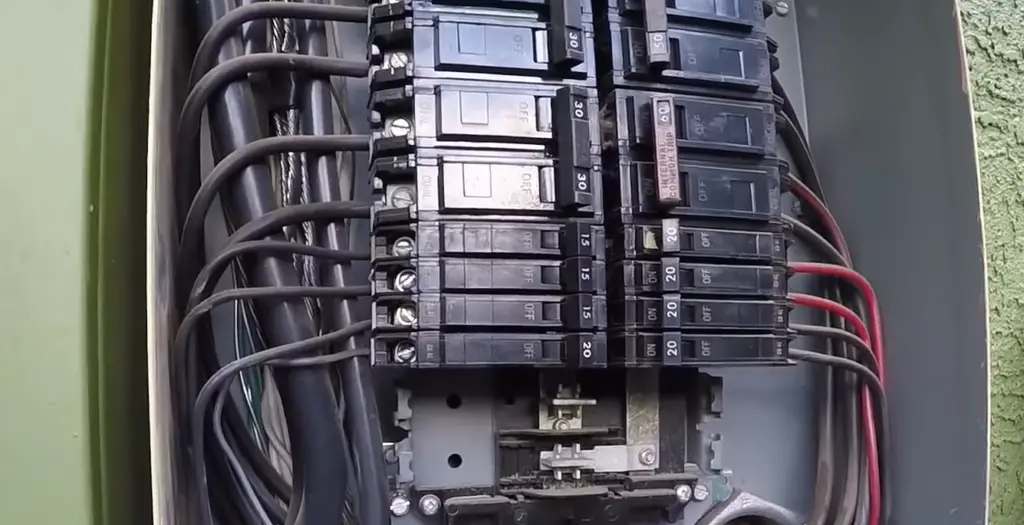
But it’s recommended to use only copper when working with higher voltage systems like a 50 amp circuit breaker and larger.
Other Factors to Consider
Length of Wire
The size of the wire matters. The longer the wire is, the more resistance it will have. You will need thicker wires for longer lengths of wire. This is true especially with higher voltage systems like a 50-amp circuit breaker.
If your total length of wires is over 100 feet, you may need to get larger gauge wiring than 8 AWG. [1]
Voltage Drop
When working on any electrical system with a voltage higher than 120 volts, it’s important to consider voltage drop.
Voltage drop occurs when electricity moves through wires and some of it is lost along the way due to resistance in the wire. This can lead to dim lights, slow motors, and other problems.
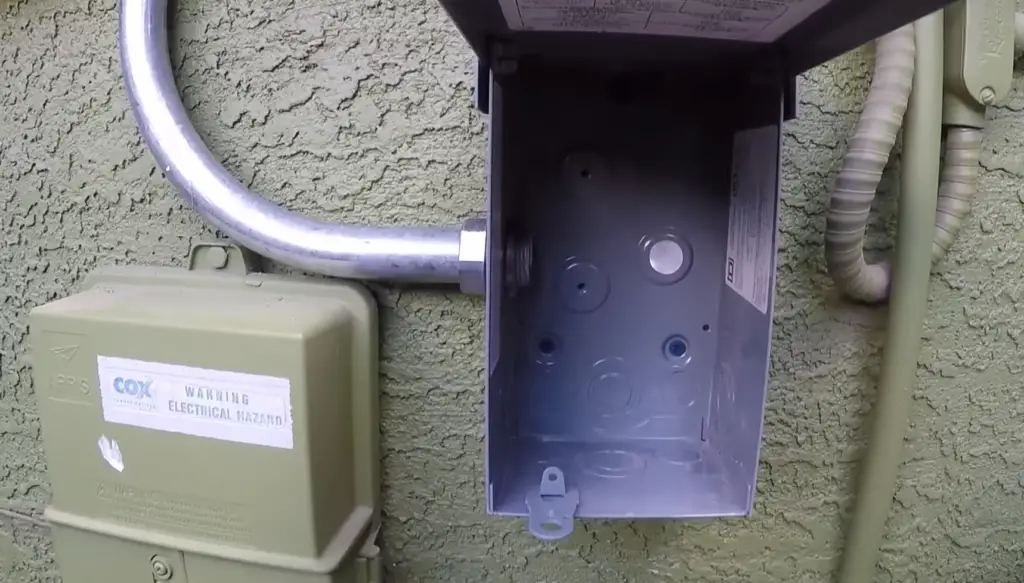
To prevent voltage drop, use the correct size wires and keep the total length of wires to a minimum. It’s also important to use good quality wiring with no defects or shorts.
Grounding Considerations
For higher voltage systems like a 50-amp circuit breaker, use insulated grounding. You need the right size wire for the ground and connect all electrical connections to the ground. It’s important to be careful when wiring.
This is essential for safety, as improper grounding can lead to serious problems or even electrocution in some cases. Make sure you are following all local building codes when wiring a 50-amp breaker.
It is important to know the basics of wiring and safety before doing any electrical work. Use wires that are the right size and length. Pay attention to things like voltage, grounding, and length of wires. This will help make sure your wiring is done correctly and safely.
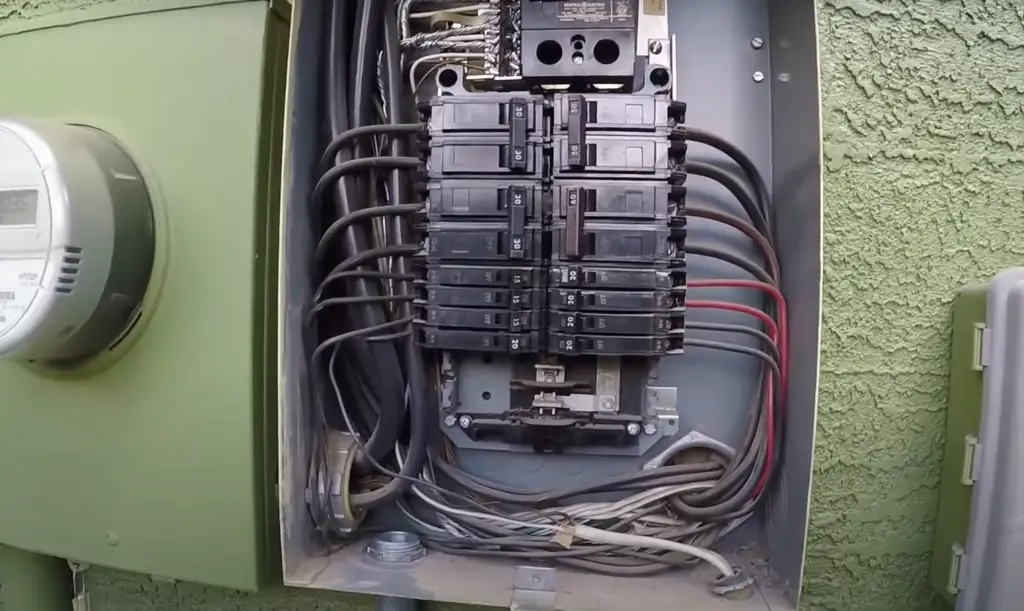
Types of Conductor Used in Wire
When wiring a 50-amp breaker, it’s best to use only copper. It is the most efficient conductor and will result in less resistance over the length of wire.
Other types of conductors such as aluminium can be used, but this should be done with caution as it can increase the risk of voltage drop.
What is the Voltage Drop for a 50-Amp Circuit Breaker?
When electricity travels through a wire over a long distance, it is called voltage drop. This means the electricity slows down and loses power. For a 50 amp circuit breaker, the voltage should not be more than 5% different from when it started.
What Size Wire Do I Need?
Once you’ve determined the length of wire and gauge needed, it’s time to choose the right size wire for your project.
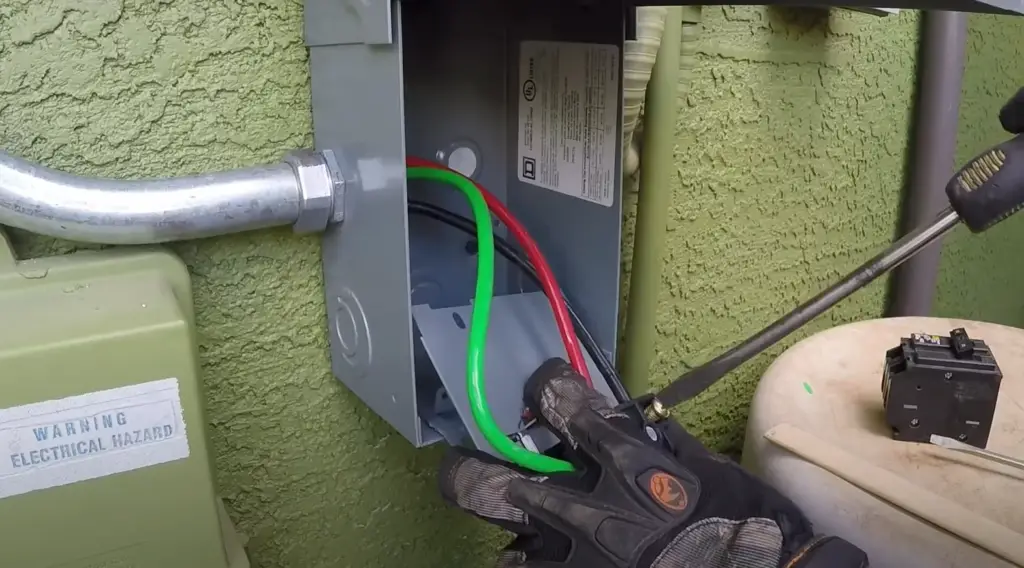
For a 50-amp circuit breaker, 8 AWG copper or 6 AWG aluminium is recommended. Make sure all wiring is free from defects and that you are following local building codes. [2]
Wire Size Ampacity Chart
Here is a chart of the recommended wire size for different amps and voltage levels. It’s important to use the correct size so your wiring project will be safe and work correctly.
Amps, Voltage | 14 AWG Copper | 12 AWG Copper | 10 AWG Copper | 8 AWG Copper
30A, 120V | – | – | OK | OK
50A, 240V | – | OK| OK|OK
60A, 240V |- |OK|OK|OK
100A, 240V |- |-|OK|OK
As you can see from the chart above, for a 50 amp circuit breaker, 8 AWG copper is the recommended wire size. It is important to use the correct size and length of wiring for your project. This will help make sure that your installation is safe and efficient.
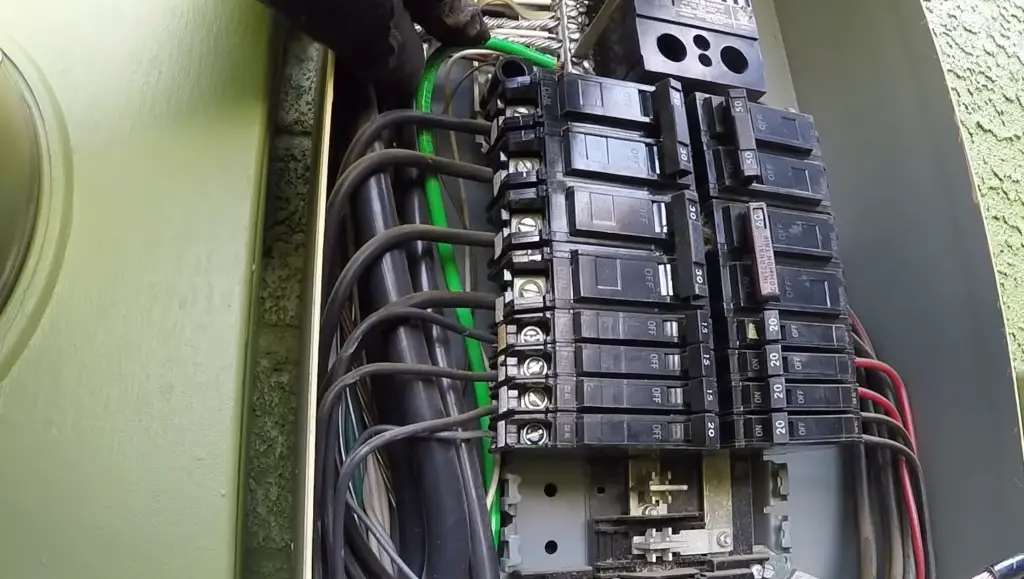
Reading Cable Labels
Look at the label on the cable to find out what kind it is. The label should tell you things like how much electricity it can take, how thick or thin it is, and what materials are inside. It’s important to read this information so you know if the cable is right for your project.
Circuit Breakers
A circuit breaker is a device that prevents excessive current from flowing through an electrical system.
It senses when too much electricity is flowing and will trip the circuit to prevent damage. Circuit breakers come in different sizes, so make sure you choose one that has the right capacity for your project.
Other Aspects to Consider
If you are wiring a 50-amp circuit breaker, make sure the wires go in the right place. The wires should not be too long or too short.
Wiring a 50-amp breaker is an important job. Make sure that you are careful and follow safety rules. Use the right size wire for your project. If you do this, it will be done safely and correctly.
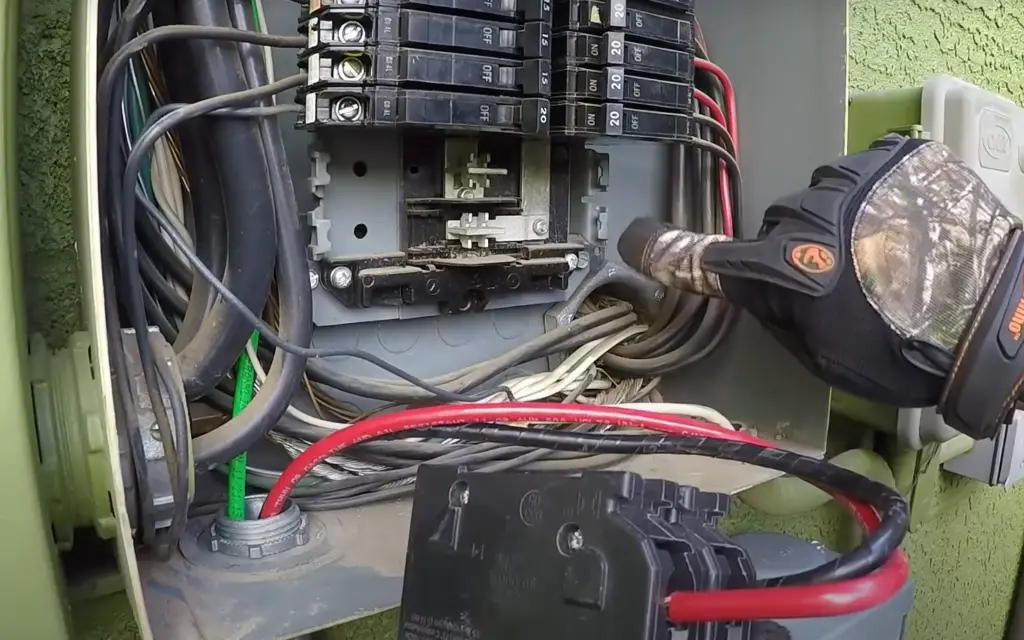
What Will Happen with the Wrong Size Wire?
Using the wrong size wire can be dangerous and cause electrical fires or sparks. It is very important to use the right size wire for your project. If you use a different size, it may not be able to handle the amount of electricity that it needs to and will create a potential fire hazard.
FAQ
Will 8 gauge wire handle 50 amps?
Yes, 8 AWG copper wire is the recommended size for a 50-amp circuit breaker.
What is the voltage drop for a 50-amp circuit breaker?
The voltage should not be more than 5% different from when it started.
Can I use aluminium wire for a 50-amp circuit breaker?
Yes, but caution should be used as it can increase the risk of voltage drop. It’s best to use 6 AWG aluminium for a 50-amp circuit breaker.
What will happen if I use the wrong size wire?
Using the wrong size wire can be dangerous and cause electrical fires or sparks. It is very important to use the right size wire for your project.
If you use a different size, it may not be able to handle the amount of electricity that it needs to and will create a potential fire hazard.
Is aluminum wire safe for a 50 amp circuit?
Using aluminum wire can be done but should be done with caution as it can increase the risk of voltage drop. It’s best to use only copper wiring when wiring a 50-amp circuit breaker.
What size breaker do I need for a 50 amp wire?
A 50-amp circuit requires a double pole breaker. The size of the breaker depends on the local electrical code, but will typically be an 80 Amp or 100 Amp rated breaker. Never use a smaller sized breaker than what is required by your local code.
What size wire should I use for a 50 amp breaker?
The recommended wire size for a 50 amp circuit breaker is 8 AWG copper. It is important to use the correct size and length of wiring for your project. This will help make sure that your installation is safe and efficient.
How far will 6 gauge wire carry 50 amps?
The 6 AWG wire can safely run 50 amps up to a distance of 80 feet. It is important to use the correct size and length of wiring for your project. This will help make sure that your installation is safe and efficient.
Can 10 gauge wire handle 50 amps?
No. 10 AWG wire is not rated for 50 amps, so using it could result in a fire hazard or damage to your electrical system. It’s best to use 8 AWG wire when wiring a 50-amp circuit breaker.
Overall, it’s important to make sure you are using the right size and type of wire for your 50-amp circuit breaker. This will help ensure the safety of your electrical system and will prevent potential fires or damage.
Make sure to always follow local codes when wiring any type of electrical system, and consult with a professional if you have any questions or concerns.
Can you put a 50 amp breaker on 8 2 wire?
No, 8 2 wire is not suitable for a 50 amp breaker. The minimum wire size for a 50 amp circuit breaker is 8 AWG copper. It’s best to use the correct size and length of wiring for your project to ensure it is safe and efficient.
How do I wire a 50 amp?
Wiring a 50 amp circuit requires the correct size and type of wire. The minimum wire size for a 50-amp circuit breaker is 8 AWG copper. It’s important to use the correct size and length of wiring for your project to ensure it is safe and efficient.
Always follow local codes when wiring any type of electrical system, and consult with a professional if you have any questions or concerns.
What size conduit do I need for a 50 amp?
The size of the conduit used for a 50-amp circuit depends on the local electrical code, but will typically be 3/4″ type LB PVC-Coated Conduit. The best way to ensure that your installation is done correctly is to always follow local codes.
What size breaker do I need for a 40 amp wire?
A 40-amp circuit requires a double pole breaker. The size of the breaker depends on the local electrical code, but will typically be a 60 Amp or 70 Amp rated breaker. Never use a smaller sized breaker than what is required by your local code.
What size wire should I use for a 60 amp?
The recommended wire size for a 60 amp circuit breaker is 6 AWG copper. It’s important to use the correct size and length of wiring for your project to ensure it is safe and efficient.
What size breaker do I need for a 100 amp service?
A 100-amp service requires a double pole breaker with the correct Amp rating. The size of the breaker depends on the local electrical code and will typically be either 125 Amp or 150 Amp rated breakers.
What is the minimum wire size for a 100 amp sub panel?
The minimum wire size for a 100-amp subpanel is 4 AWG copper. It’s important to use the correct size and length of wiring for your project to ensure it is safe and efficient.
What size breaker do I need for a 30 amp outlet?
A 30-amp circuit requires a single pole breaker with the correct Amp rating. The size of the breaker depends on the local electrical code, but will typically be a 30 Amp rated breaker.
Never use a smaller sized breaker than what is required by your local code. Always follow local codes when wiring any type of electrical system, and consult with a professional if you have any questions or concerns.
How many amps can a 12 gauge wire handle?
A 12 AWG copper wire is rated for 20 Amps and should not be used on circuits that exceed this rating. It’s important to use the correct size and length of wiring for your project to ensure it is safe and efficient.
Why is it important to use the correct size and length of wire for a circuit?
It is important to use the correct size and length of wire for a circuit in order to ensure safety and efficiency. Wiring that is too large can cause excess heat, arcing, and potential fire or shock hazards.
Wiring that is too small can result in overloading, overheating, and potentially damaging the circuit or device. It is important to check local building codes when wiring any type of electrical system, and consult with a professional if you have any questions or concerns.
Why is it important to follow local codes when wiring any type of electrical system?
It is important to follow local codes when wiring any type of electrical system because these codes are in place to ensure safety and efficiency. Wiring a circuit incorrectly can result in overloading, overheating, arcing, fire, or shock hazards.
It is essential to consult with a professional if you have any questions or concerns about the wiring codes.
What are some other tips for wiring safely?
Some other tips for wiring safely include using a circuit breaker that is rated correctly for the type of circuit, double-checking all connections to ensure they are secure, and using approved materials when necessary.
Additionally, it is important to avoid running wires near any flammable objects, and never run a wire over sharp edges. Finally, make sure all exposed wiring is well-insulated and secured tightly to prevent shocks.
Does the size of the wire matter when connecting to a circuit breaker?
Yes, the size of the wire matters when connecting to a circuit breaker. The correct size and length of wiring must be used in order for it to be safe and efficient. Wiring that is too small can result in overloading, overheating, and potentially damaging the circuit or device.
Do I need to use a GFCI breaker when wiring a 50-amp circuit?
Yes, you should use a ground-fault circuit interrupter (GFCI) breaker when wiring a 50-amp circuit. This type of breaker provides additional protection by monitoring for current imbalances in the system and automatically shutting off power if it detects any.
GFCI breakers are required by local codes in many areas, so it is important to check with your local building department before wiring any type of electrical system. Consulting with a professional can also be helpful if you have any questions or concerns.
What other safety precautions should I take when working on an electrical system?
When working on an electrical system, it is important to take the necessary safety precautions. Always turn off power at the main breaker box before beginning any work, and make sure all exposed wiring is insulated and secured tightly.
Additionally, avoid running wires near any flammable objects and never run a wire over sharp edges. Finally, double-check all connections to ensure they are secure.
Do I need to use a ground wire when wiring a 50-amp circuit?
Yes, you should use a ground wire when wiring a 50-amp circuit. Ground wires are an important safety feature that helps protect against shocks and fire hazards.
The size of the ground wire must be matched with the size of the other wires in the system; for example, if the other wires are 8-gauge, then the ground wire must also be 8-gauge.
It is important to check local building codes when wiring any type of electrical system, and consult with a professional if you have any questions or concerns.
Does the length of the wire matter when connecting to a circuit breaker?
Yes, the length of the wire matters when connecting to a circuit breaker. Longer wires create more resistance in the system, which can reduce efficiency and increase overheating.
Wiring that is too long can also be difficult to manage, making it more prone to damage or shorts.
Do I need to use a specific type of wire for a 50-amp circuit?
Yes, you should use specific types of wires for any 50-amp circuit. For safety reasons, the type and size of the wiring must be matched with the amperage rating of the breaker.
Local codes may also require certain types of wiring for certain applications; for example, aluminum wiring may be required in some areas. Consulting with a professional can also be helpful if you have any questions or concerns.
What other materials should I use when working on an electrical system?
In addition to the correct type and size of wiring, it is important to use approved materials when necessary when working on an electrical system. Non-metallic sheathing should be used to insulate wires, and approved connectors must also be used to connect the wiring to the breaker box or other components.
Additionally, circuit breakers must be properly rated for the amperage of the system. Finally, make sure all exposed wiring is insulated and secured tightly.
Can a 50-amp breaker be used on a smaller wire?
No, a 50-amp breaker should not be used with a smaller wire. Wiring must always match the amperage rating of the breaker in order to avoid overheating and potential damage to the circuit or device.
If you have any questions or concerns, consulting with an electrician or other professional is the best way to ensure your system is wired safely and correctly.
Are there any special considerations when wiring a 50-amp circuit?
Yes, there are certain special considerations that should be taken into account when wiring a 50-amp circuit. It is important to use the correct type and size of wiring for the amperage rating, and to make sure wires are run in an organised manner.
Additionally, all exposed wiring should be insulated and secured tightly, and verified with a voltage tester. Finally, double-check all connections to ensure they are secure.
Can a 50-amp wire be used on a 20-amp circuit?
No, a 50-amp wire should never be used on a 20-amp circuit. Wiring must always match the amperage rating of the breaker to avoid overheating, and potential damage to the circuit or device.
If you have any questions or concerns regarding your wiring, it is always best to consult with an electrician or other professional.
Which wire gauge should be used for a 50-amp circuit?
The type and size of wires used for a 50-amp circuit should be determined by the amperage rating. Generally, 8-gauge wiring is recommended when working with a 50-amp breaker; however, local building codes may have different requirements or restrictions.
It is important to check local codes and consult with a professional if you have any questions or concerns. Additionally, the ground wire should be the same gauge as the other wires.
Useful Video: 50A Welding Outlet and Breaker Install
Conclusion
To use a 50-amp breaker, you need to know how many paths the circuit will take and how long the circuit will be. You also need to know what it is powering. Usually, 8-gauge copper or aluminum wire is enough for this kind of circuit. Using the right size wire helps keep your house safe.
It is important to talk to an electrician if you want to know the right size of wire for a 50-amp breaker. You may have to spend some money on getting bigger wires, but it will be worth it because you will be keeping your family safe.
So make sure that you double check what size wire you need for a 50-amp breaker – it is better to be safe than sorry!
References
- https://www.galvinpower.org/what-size-wire-for-a-50-amp-breaker/
- https://www.totalhomesupply.com/wires-and-circuit-breakers





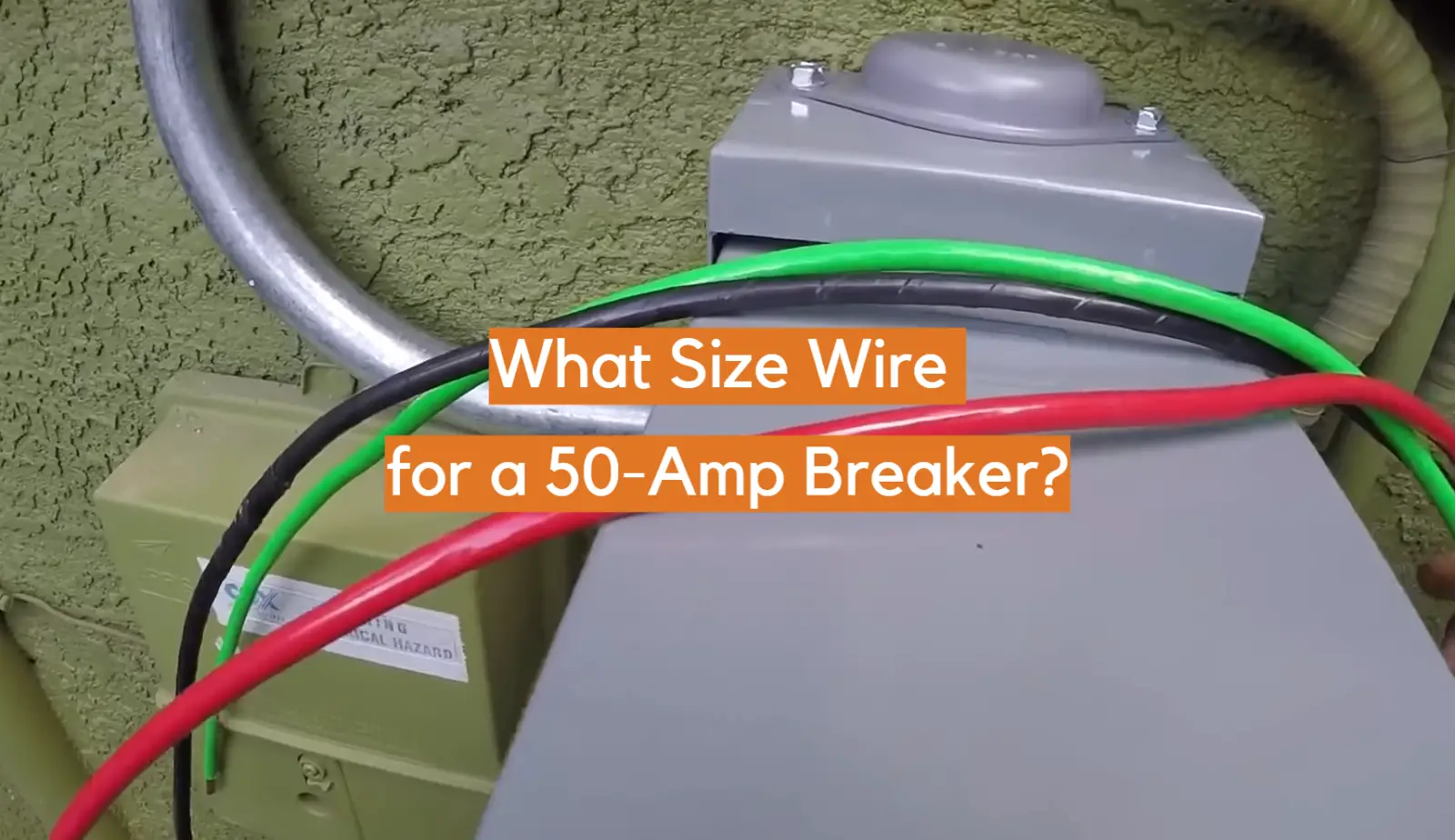








Leave a Reply